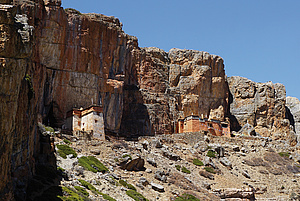Buddhist Architecture in the Western Himalayas
The extensive collection of research material on Buddhist Architecture in the Western Himalayas compiled at Graz University of Technology over the last two decades as part of FWF-funded projects, focuses on the survey and documentation of religious monuments which are related to the Second Diffusion of Buddhism in the 10th and 11th centuries, when political power shifted toward the western borders of the Tibetan cultural world to Northern India and Western Tibet. The research project completed in March 2021 focused on sacred buildings in the border region of the Western Himalayas, in particular on temple architecture in the culturally Tibetan region of Dolpo in Western Nepal. To expand the existing research material, these buildings were subject to an in-depth comparative analysis which resulted in an inventory and a detailed building documentation––including settlement and site plans, floor plans, ceiling plans, sections and views in different scales––serving as the basis for future research and restoration measures. Another essential part of the project involved the the completion of the comparative material concerning the three early monastic complexes in Tholing (Tibet), Nyarma and Tabo (Northern India).
The results have been published both on the research project website (www.archresearch.tugraz.at) and in the third volume of the publication series Buddhist Architecture in the Western Himalaya: The Ancient Monastic Complexes of Tholing, Tabo and Nyarma, edited by Holger Neuwirth and Carmen Auer. In addition, the architectural documentation of the temple complex of Alchi/Ladakh was revised and supplemented, and the results have been published as a contribution to the book ALCHI - Ladakh´s Hidden Buddhist Sanctuary, edited by Christian Luczanits (SOAS London).
Project duration:
2018 – 2021
Funding:
Fonds zur Förderung der wissenschaftlichen Forschung Österreichs (FWF) | Austrian Science Fund
Project team:
Institute of Architectural Theory, Art History and Cultural Studies at TU Graz: Anselm Wagner (project leader), Carmen Auer, Birgit Androschin, Dieter Bauer, Holger Neuwirth

